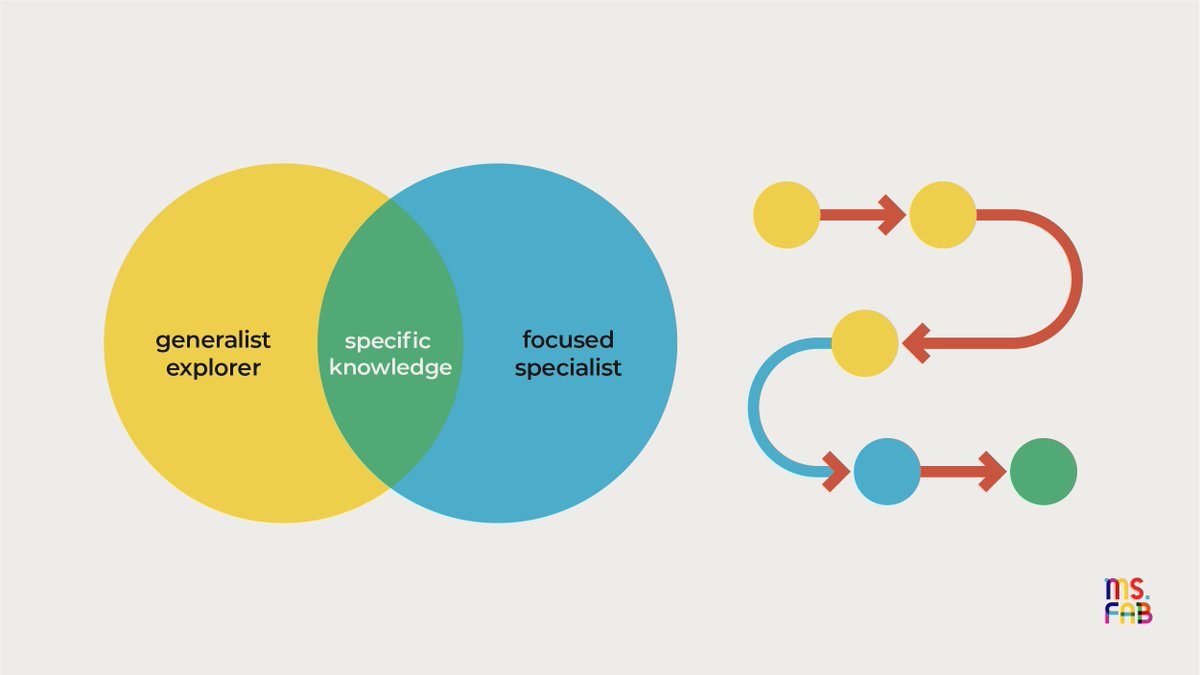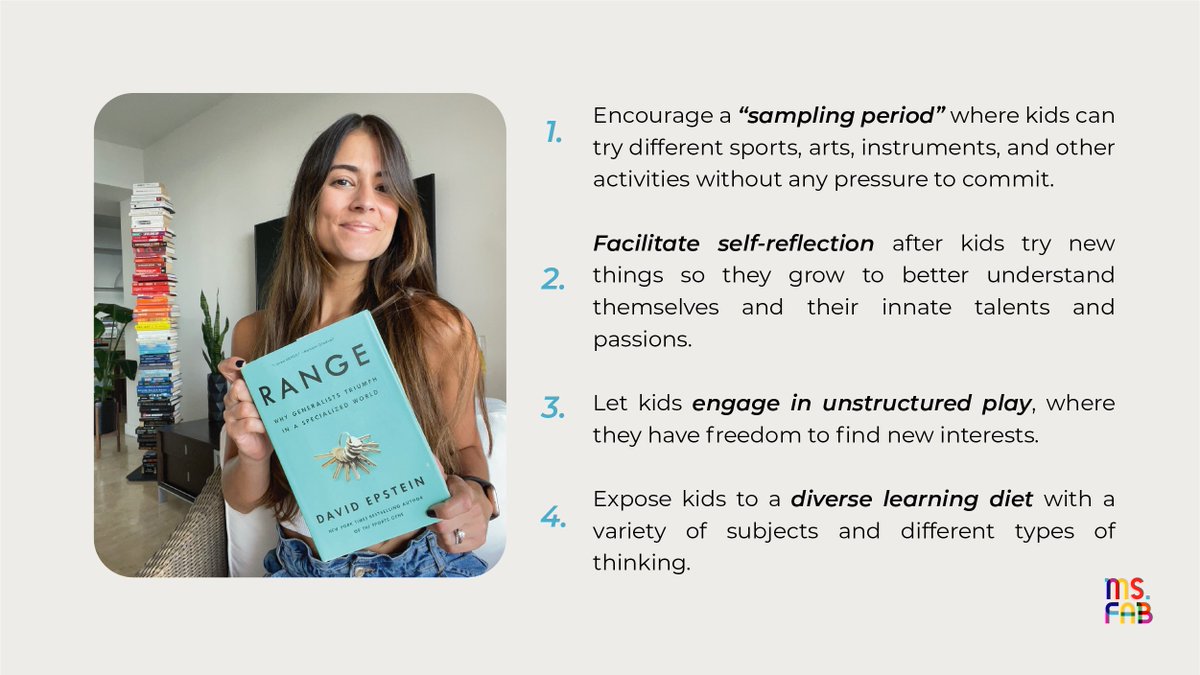If we want exceptional children, we should encourage them to specialize early!
…right? Time to bust this myth https://abs.twimg.com/emoji/v2/... draggable="false" alt="🧨" title="Firecracker" aria-label="Emoji: Firecracker">
https://abs.twimg.com/emoji/v2/... draggable="false" alt="🧨" title="Firecracker" aria-label="Emoji: Firecracker">
Why we should generalize, *then* specialize https://abs.twimg.com/emoji/v2/... draggable="false" alt="👇🏼" title="Rückhand Zeigefinger nach unten (mittelheller Hautton)" aria-label="Emoji: Rückhand Zeigefinger nach unten (mittelheller Hautton)">
https://abs.twimg.com/emoji/v2/... draggable="false" alt="👇🏼" title="Rückhand Zeigefinger nach unten (mittelheller Hautton)" aria-label="Emoji: Rückhand Zeigefinger nach unten (mittelheller Hautton)">
…right? Time to bust this myth
Why we should generalize, *then* specialize
In some fields, early specialization works well. Think about golf  https://abs.twimg.com/emoji/v2/... draggable="false" alt="⛳️" title="Golffahne" aria-label="Emoji: Golffahne">
https://abs.twimg.com/emoji/v2/... draggable="false" alt="⛳️" title="Golffahne" aria-label="Emoji: Golffahne">
Tiger Woods picked up his first putter at seven months old.
At two, he was on TV hitting golf balls with Bob Hope.
At four, he was practicing eight hours a day, winning bets against adults.
Tiger Woods picked up his first putter at seven months old.
At two, he was on TV hitting golf balls with Bob Hope.
At four, he was practicing eight hours a day, winning bets against adults.
Early specialization worked for Tiger because golf is a predictable sport.
The skills he learned at two will apply to golf for the rest of his life.
It’s a stable game. Very little changes.
The skills he learned at two will apply to golf for the rest of his life.
It’s a stable game. Very little changes.
But few things in life are like golf.
We live in a world filled with ambiguity, complexity, and constant change https://abs.twimg.com/emoji/v2/... draggable="false" alt="🌎" title="Amerika auf dem Globus" aria-label="Emoji: Amerika auf dem Globus">
https://abs.twimg.com/emoji/v2/... draggable="false" alt="🌎" title="Amerika auf dem Globus" aria-label="Emoji: Amerika auf dem Globus">
Today, the people who succeed the most draw on a generalist background. They know how to mix different approaches together to face new and unexpected challenges https://abs.twimg.com/emoji/v2/... draggable="false" alt="✨" title="Funken" aria-label="Emoji: Funken">
https://abs.twimg.com/emoji/v2/... draggable="false" alt="✨" title="Funken" aria-label="Emoji: Funken">
We live in a world filled with ambiguity, complexity, and constant change
Today, the people who succeed the most draw on a generalist background. They know how to mix different approaches together to face new and unexpected challenges
In his book Range, @DavidEpstein argues that:
“many of the most effective people in elite professional fields (like sports, art, scientific research) succeed not *despite* the fact but *because* they find their way to that particular field after pursuing other endeavors first”
“many of the most effective people in elite professional fields (like sports, art, scientific research) succeed not *despite* the fact but *because* they find their way to that particular field after pursuing other endeavors first”
In other words, generalism and specialism are friends, not enemies.
But the order matters.
Generalize *then* specialize.
Not the other way around!
But the order matters.
Generalize *then* specialize.
Not the other way around!
When we specialize early, it’s easy to fall into “functional fixedness.”
We go blind to creative solutions because we mastered only one set of skills.
“Give a small boy a hammer, and he will find that everything he encounters needs pounding.” —Kaplan https://en.wikipedia.org/wiki/Functional_fixedness">https://en.wikipedia.org/wiki/Func...
We go blind to creative solutions because we mastered only one set of skills.
“Give a small boy a hammer, and he will find that everything he encounters needs pounding.” —Kaplan https://en.wikipedia.org/wiki/Functional_fixedness">https://en.wikipedia.org/wiki/Func...
Early generalism helps kids see from different perspectives. It gives them a big box of thinking tools.
That’s the idea behind @synthesischool. Our simulations help kids develop their judgment, sense-making, and collaboration—essential abilities for every career & calling.
That’s the idea behind @synthesischool. Our simulations help kids develop their judgment, sense-making, and collaboration—essential abilities for every career & calling.
When you generalize early and specialize late, it also helps you develop specific knowledge.
You’re building a knowledge stack.
You’re honing in on what you can offer the world that no one else can. https://twitter.com/anafabrega11/status/1420025602304876545">https://twitter.com/anafabreg...
You’re building a knowledge stack.
You’re honing in on what you can offer the world that no one else can. https://twitter.com/anafabrega11/status/1420025602304876545">https://twitter.com/anafabreg...
So, before you sign up your 6-year-old for daily golf lessons, try these four tactics for helping them develop range:
1. Encourage a “sampling period” where kids can try different sports, arts, instruments, etc without any pressure to commit. https://twitter.com/AdamMGrant/status/1421100223699488769">https://twitter.com/AdamMGran...
1. Encourage a “sampling period” where kids can try different sports, arts, instruments, etc without any pressure to commit. https://twitter.com/AdamMGrant/status/1421100223699488769">https://twitter.com/AdamMGran...
2. Let kids also engage in unstructured play, where they have the freedom to find new interests  https://abs.twimg.com/emoji/v2/... draggable="false" alt="🤸🏼" title="Person, die ein Rad schlägt (mittelheller Hautton)" aria-label="Emoji: Person, die ein Rad schlägt (mittelheller Hautton)">
https://abs.twimg.com/emoji/v2/... draggable="false" alt="🤸🏼" title="Person, die ein Rad schlägt (mittelheller Hautton)" aria-label="Emoji: Person, die ein Rad schlägt (mittelheller Hautton)">
3. Facilitate self-reflection after kids try new things so that they grow to better understand themselves and their innate talents and passions https://abs.twimg.com/emoji/v2/... draggable="false" alt="💭" title="Gedankenblase" aria-label="Emoji: Gedankenblase">
https://abs.twimg.com/emoji/v2/... draggable="false" alt="💭" title="Gedankenblase" aria-label="Emoji: Gedankenblase">
3. Facilitate self-reflection after kids try new things so that they grow to better understand themselves and their innate talents and passions
4. Expose kids to a diverse learning diet with various subjects and different types of thinking  https://abs.twimg.com/emoji/v2/... draggable="false" alt="🧠" title="Gehirn" aria-label="Emoji: Gehirn">
https://abs.twimg.com/emoji/v2/... draggable="false" alt="🧠" title="Gehirn" aria-label="Emoji: Gehirn"> https://abs.twimg.com/emoji/v2/... draggable="false" alt="📦" title="Paket" aria-label="Emoji: Paket"> https://twitter.com/anafabrega11/status/1414961344902836232">https://twitter.com/anafabreg...
https://abs.twimg.com/emoji/v2/... draggable="false" alt="📦" title="Paket" aria-label="Emoji: Paket"> https://twitter.com/anafabrega11/status/1414961344902836232">https://twitter.com/anafabreg...
Range is *not* about forcing kids into five different after-school programs.
Instead, it’s about letting them explore and play.
It’s about cheering when they venture outside their comfort zones and celebrating as they discover what they love to do most.
Instead, it’s about letting them explore and play.
It’s about cheering when they venture outside their comfort zones and celebrating as they discover what they love to do most.
If you want to dive deeper, check out this thread by @james_d_baird! https://twitter.com/james_d_baird/status/1421115204121808905?s=20">https://twitter.com/james_d_b...
I explore ideas like this in Fab Fridays, my newsletter on childhood education with a twist + new ways to learn.
Subscribe below! https://abs.twimg.com/emoji/v2/... draggable="false" alt="🤸🏼" title="Person, die ein Rad schlägt (mittelheller Hautton)" aria-label="Emoji: Person, die ein Rad schlägt (mittelheller Hautton)"> https://afabrega.com/newsletter ">https://afabrega.com/newslette...
https://abs.twimg.com/emoji/v2/... draggable="false" alt="🤸🏼" title="Person, die ein Rad schlägt (mittelheller Hautton)" aria-label="Emoji: Person, die ein Rad schlägt (mittelheller Hautton)"> https://afabrega.com/newsletter ">https://afabrega.com/newslette...
Subscribe below!

 Read on Twitter
Read on Twitter



